I was driving to work this morning when my car started smoking. I pulled over to the side of the road, but it was too late. The car died, and I had to call a tow truck.
I’m not sure what happened, but I’m pretty sure it’s not covered by my warranty. I’ll have to get it checked out by a mechanic and see what’s wrong. In the meantime, I’m stuck taking the bus.
My Car Started Smoking – What Should I Do
Contents
I was driving my car and it started smoking, so I pulled over and turned it off. It won’t start back up again and I’m not sure what to do.
My Car Died – Potential Causes
If your car starts smoking and then dies, there are a few potential causes. It could be an issue with the engine, the electrical system, or a problem with the fuel system. If you’re not sure what the problem is, it’s best to take your car to a mechanic or dealership for diagnosis and repair.
What Could Have Caused My Car to Start Smoking?
There are many potential causes of your car smoking before it dies.
- If the smoke is coming from the engine, it could be an indication of an oil or coolant leak.
- If the smoke is coming from under the hood, it could be an electrical issue.
- If the smoke is coming from the tires, it could be a sign that the brakes are overheating.
You should take your car to a mechanic to have it diagnosed and repaired as soon as possible.

What Could Have Caused My Car to Die – 3 Causes
There are a few things that could have caused your car to die:
- A clogged fuel filter could have prevented fuel from getting to the engine.
- A failed ignition coil or spark plugs could have prevented the engine from starting.
- A leak in the cooling system could have caused the engine to overheat.
How Can I Prevent My Car From Smoking?
If you notice your car smoking, it is important to take action immediately to prevent further damage. Smoke from your car can indicate a variety of problems, including oil leaks, coolant leaks, or a problem with your combustion chamber.
If you see smoke coming from under the hood, it is likely that there is an oil leak. Check all of your hoses and seals for any cracks or leaks. If you see smoke coming from your tailpipe, this usually indicates a problem with your combustion chamber. Have a mechanic check your engine to make sure the chambers are clean and free of debris.

If you see smoke coming from the front of the car, it is likely that there is a coolant leak. Check all of your coolant hoses for any cracks or leaks. Be sure to check the radiator as well. If you find a leak, it is important to have it repaired as soon as possible to avoid further damage to your engine.
How Can I Prevent My Car From Dying?
If your car has recently been smoking and then dying, there are a few potential causes. It could be that your engine is low on oil, or that there is a problem with your fuel injectors. Check your engine oil level first, and if it is low, add more oil. If your car is still smoking and dying, take it to a mechanic to have the fuel injectors checked.
What Should I Do if My Car Starts Smoking – Check the Smoke Color
If your car starts smoking, it’s important to take action immediately. Depending on the cause of the smoke, it could be a sign of a serious problem with your car.
- If you see white smoke coming from your car, it could be a sign of an antifreeze leak. Antifreeze is a poisonous substance, so it’s important to take care of this problem right away.
- If you see blue smoke, it could be a sign of oil burning in your engine. This is usually due to an issue with your piston rings or valves. Blue smoke can also be caused by water dripping onto hot exhaust components.
- If you see black smoke, it’s usually a sign that there’s too much fuel being burned in the engine. This can be caused by several things, including a clogged air filter or carburetor, or a problem with the engine itself.
If your car starts smoking, pull over as soon as possible and turn off the engine. Then call a tow truck or mechanic to have your car looked at.
What Should I Do if My Car Dies – 4 Things To Do
If your car won’t start, or it dies while you’re driving, there are a few things you can do to try to troubleshoot the problem.
- First, check the battery to see if it needs to be replaced or charged.
- If the battery is fine, then next check the spark plugs and wires to see if they need to be replaced.
- If those are both working, then the problem might be with the fuel system, and you’ll need to take it to a mechanic to have it looked at.
- In any case, if your car won’t start or dies while you’re driving, it’s always best to call a tow truck and have it towed to a nearby service station for further diagnosis.
FAQs(Frequently Asked Questions)
Is It Bad to Drive When Car is Smoking?
How Do You Fix a Smoking Car Engine?
What to Do if Smoke is Coming From Car?
What Does It Mean When a Car is Blowing Smoke?
Why is My Car Smoking but Not Overheating?
Can Low Oil Cause White Smoke?
How Do I Know if My Car is Overheating?
- A hood that is hot to the touch.
- A warning light or the temperature gauge on your dashboard.
- A loud ticking noise.
- Coolant on the ground.
Can Low Oil Cause Overheating?
What Do You Do When Your Car Blows White Smoke?
Since water and coolant may have bubbled up, you should also inspect your coolant. After the engine has been turned off for a few minutes, open up the radiator and check the coolant levels. If you saw white smoke, there’s a good chance you’ll be low on coolant, too.
Conclusion
Smoke often leaves car engines as a result of overheating. This can be caused by faulty wire casings, heated residues on the engine block and overheated liquids including oil, transmission fluid and brake fluid. There may also be a fault in your coolant system, or your engine may not have enough lubricant.
The most common causes of smoke without an overheating engine are:
- Oil spillage – it’s important to use a funnel when topping up engine oil. Plastic and rubber parts can break down prematurely when submerged in the liquid over time.
- Oil leaks – rather than somebody spilling oil, leaks occur where faulty parts fail to contain or transport liquid securely.
- Oil filler caps – when fuel is burnt in some cars they can leave a dark residue. Older engines usually produce more hotspots that burn the residue as smoke.
- Faulty wires – it’s easy to recognise a smoking wire, as the faulty parts will give off a strong odour. If the problem comes from your alternator’s copper wires, the smell won’t be as strong but your car’s engine lights should turn on.
- Leaking coolant – your coolant overflow tank can leak fluid that burns and lets off steam.
